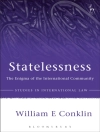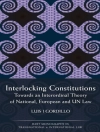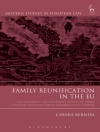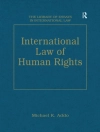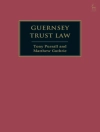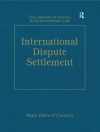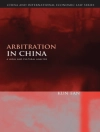This is the first book that critically examines the reform of the Appellate Body (AB) of the World Trade Organization (WTO) in light of the current crisis resulting from the U.S. blocking of the appointment of its members. The reform of the AB is critical, as the appointment crisis could lead to the demise of “the jewel in the crown, ” which may even cause the dismantling of the WTO as a whole. This book covers various aspects of the crisis and its reform. Specifically, as the crisis cannot be fully understood without reviewing the role of the AB from the broader perspectives of the other functions of the WTO, the book examines the reform of the AB from the broader perspectives of the WTO governance. Additional focus is on the reform of the AB in relation to its specific functions. Available options are provided to address the AB crisis, as well as discussion of wider implications beyond the WTO. Contributed by world-renowned academics, experts, and practitioners in the field ofinternational economic law, this volume provides a comprehensive analysis of the AB crisis and its solutions.
Tabla de materias
Part I: The AB in the WTO Governance and Its Reform – Broader Perspectives.- Introduction: Saving the Jewel in the Crown.- Between “Member-Driven Governance” and “Judicialization”: Constitutional and Judicial Dilemmas in The World Trading System.- Reforming the Appellate Body.- The AB Crisis as Symptomatic of the WTO’s Foundational Defects or: How I Learned to Stop Worrying and Love the AB.- The Impending Demise of the WTO Appellate Body: From Centrepiece to Historical Relic?.- WTO Appellate Body Overreach and the Crisis in the Making: A View from the South.- Part II: Reforms in Relation to the Basic Functions of the AB.- Why the WTO Adjudicatory Crisis Will Not Be Easily Solved: Defining and Responding to “Judicial.- Activism”.- A Proper Balance between WTO’s Members-Driven Nature and the Appellate Body’s Role as an Adjudicator – Careful Exercise of Judicial Activism.- The Judicial Style of the Appellate Body.- Interpretative Authority of the Appellate Body: Replies to the Criticism by the United States.- Judicial Economy and Advisory Opinions of the Appellate Body – Potential Reform of Article 17.12 of the DSU.- The Use of Panel Process to Improve the Function of the Appellate Body: A Proposal to Utilize the Expert Review Group.- Part III: Options to Address the Crisis and Wider Implications Beyond the WTO.- Disruptive Construction or Constructive Destruction? Reflections on the Appellate Body Crisis.- WTO Appellate Body at Crossroads: Options and Alternatives.- Appointment and Reappointment of the Appellate Body Members: Judiciary or Politics.- Should Appellate Body Members Work Full Time.- The Appellate Body as a Trailblazer – Facilitation of Appellate Mechanism Discussion in Other International Courts.- The WTO AB as a Model for Other Adjudicatory Bodies – the Case of EU Investment Court System.-
Sobre el autor
Chang-fa Lo has been Justice of the Constitutional Court of the ROC (Taiwan) since October 2011. Prior to his current judicial position, he was Chair Professor and Lifetime Distinguished Professor at National Taiwan University (NTU); Dean of NTU College of Law; Founding Director of the Asian Center for WTO and International Health Law and Policy of NTU College of Law (ACWH); Founding Director of the Center for Ethics, Law and Society in Biomedicine and Technology of NTU; Commissioner of Taiwan’s Fair Trade Commission; Commissioner of Taiwan’s International Trade Commission; and legal advisor for Taiwan’s GATT/WTO accession negotiations. In his capacity as Director of the ACWH, Prof. Lo launched two English journals, namely, the Asian Journal of WTO and International Health Law and Policy (AJWH, an SSCI listed journal) and the Contemporary Asia Arbitration Journal (CAA) in 2006 and 2008, respectively. During his tenure as Dean of NTU College of Law, he also launched the English journal, the NTU Law Review. He was appointed by the WTO as a panelist for the case of DS332 Brazil—Measures Affecting Imports of Retreaded Tyre in 2006, and the case of DS468 Ukraine—Definitive Safeguard Measures on Certain Passenger Cars in 2014, and appointed as a member of the Permanent Group of Experts under the SCM Agreement of WTO in 2008. He was been Chairman of the Asia WTO Research Network (AWRN) from 2013 to 2019. Prior to his teaching career, he practiced law in Taipei. He received his S.J.D. degree from Harvard University Law School in 1989. He is the author of 13 books (including “Treaty Interpretation under the Vienna Convention on the Law of Treaties—A New Round of Codification” published by Springer) and the editor of seven books (including “Taiwan and International Human Rights – A Story of Transformation” also published by Springer), and he has authored more than 100 journal papers and book chapters. He was granted the “National Professorship Award” by the Ministry of Education and the “Outstanding Scholarship Chair Professorship Award” by the Foundation for Advancement of Outstanding Scholarship.
Junji Nakagawa is professor at the Faculty of Liberal Arts, Chuo Gakuin University, and an Advisor at Anderson, Mori & Tomotsune LLP. He is also a Professor Emeritus of the University of Tokyo. He got B.A., M.A. and LL.D from the University of Tokyo. He has over 40 years’ experience of teaching/research of international economic law. He is Chairperson of the Asian International Economic Law Network (AIELN) and the Asian WTO Research Network (AWRN). He also worked for the Society of International Economic Law (SIEL) as a Member of its Council (2008 to 2018) and a Co-Treasurer (2015 to 2018). His major publications include: Commentary on Trans-Pacific Partnership (TPP), Japan Tariff Association, 2019; International Economic Law, 3rd ed., Yuhikaku, 2019; Nationalization, Natural Resources and International Investment Law, Routledge, 2017; WTO: Beyond Trade Liberalization, Iwanami Shoten, 2013; Transparency in International Trade and Investment Dispute Settlement, Routledge, 2013; and International Harmonization of Economic Regulations, Oxford University Press, 2011.
Tsai-fang Chen is associate professor of National Chiao Tung University School of Law. His main areas of research are international economic law, international commercial arbitration, international investment law, and patent law. Tsai-fang Chen has obtained his SJD degree in University of Wisconsin Law School, LLM degree at Columbia University School of Law and National Taiwan University, and LLB degree at National Chengchi University. He has worked in Wisconsin Alumni Research Foundation on patent law issues. Tsai-fang Chen has also practiced law at Wu and Partner, Attorneys-at-law, Taipei, Taiwan on antidumping cases. Tsai-fang Chen has lectured in the intensive Course ‘IP in Asia’ in Advanced Master in Intellectual Property Law and Knowledge Management (LLM/MSc), Maastricht University. He has also worked as a consultant to Office of Trade Negotiations, Ministry of Economic Affairs in Taiwan. Tsai-fang Chen has published articles on international economic law in Asian Journal of WTO & International Health Law and Policy and Contemporary Asia Arbitration Journal. Tsai-fang Chen has also published an article on patent law in Wake Forest Intellectual Property Law Journal. Tsai-fang Chen is a member of the Asian Center for WTO & International Health Law and Policy. Tsai-fang Chen is a committee member of the Editorial Committee of the Contemporary Asia Arbitration Journal.


